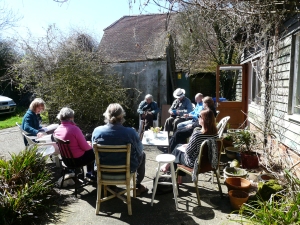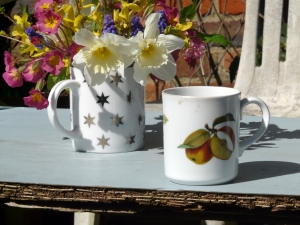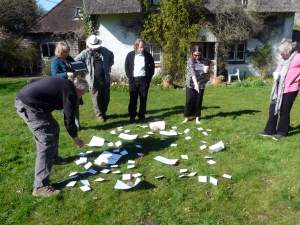When did you last smile? The question started us going. I belong to a bunch of friends, 10 to 20, who meet monthly. We rotate the facilitation of sessions. People propose themes worthy of engagement. Our April session had the theme of Positive Psychology. The term, coined by Martin Seligman, has been called unoriginal and evokes ongoing controversies, not least because basic theories promoting well-being have been around for a long time, for centuries. Overall, the disputes are creative.
The off-the-track cottage and studio we hire for our monthly meetings has a delightful atmosphere. We love it, though its structure is gradually falling apart. The custodians of the property have more pressing concerns, and so have we. After a unique international creative centre was lost to us eight years ago, this liminal space offered itself. Here we challenge and cherish each other, explore ideas and welcome guests.
As to the initial question of the day – when did you last smile? – Of late, I frequently smile at my quirky thoughts. That day however, I recalled waking early and passing a vase brimming with pale double daffodils, splayed open to full perfection in the morning sun. No matter how fleeting an instant of wholeness, it tends to ravish me into my veiled wholeness. The exquisite flowers invigorated every cell in my body and set the tone for my day. It was a moment of transcendence, of grace.
We explored scientific findings as to what goes on in different parts of our brain when we experience emotions. There is evidence, for example, that prolonged stress weakens the immune system. Stress may be real or imagined. It can be maintained by resentment, anxiety, learned helplessness and the anticipation of negative outcomes, often based on scary experiences (even in the womb) that informed expectations, like the world is unsafe and we have no control over events. Neurobiology is fascinating, though I wonder if it can ever explain existential questions about phenomenology. Some of us bring along a lucky or unlucky disposition, but a great deal of what we become seems to depend on the interpretation and meaning we give to what is happening to us.
Which begs the question, can optimism be learned through challenging negative self-talk, the kind that rubs it in, like – here we go again, I should’ve know, stupid me, no matter what I do – and so on. For some people prolonged attention to self-talk works. Many brilliant techniques have been developed to overlay fixed habits. Extensive research has gone into the mastery of happiness, especially in the US. This said – Martin Seligman, the father of Positive Psychology, acknowledges that negativity is part of the human condition. As such, I see negativity having a compelling function in social systems that first make us ill and then sell us pills, a larger story…
I tend to huff when a generic psychological approach is wrapped up as a brand and turned into an industry, and Positive Psychology has become a successful industry during the last decade. Then again, there were a great many innovators since Abraham Maslow, who, inspired by ancient wisdom traditions was the first to challenge Psychology’s focus on pathology at the time, by researching what motivates people up the hierarchy of needs, and by defining the qualities of achievers. The work of Seligman and his colleagues seeks to encourage functionality, resilience and well-being. It provides further valuable applications and insights regarding human potential that are worth studying.
I personally lean towards the subtle wisdom regained during my training with Psychosynthesis in the 1980s. We may reach peak states of awareness as our consciousness expands, bliss even, yet each higher view calls for a journey down, into denser spheres. C G Jung put it well … ‘As far as we can discern, the sole purpose of human existence is to kindle a light of meaning in the darkness of mere being.’
Our group is an irreverent lot. We had fun, warm and lively discussions, and we engaged with personal questions. From a set of 24 cards we chose our 5 dominant signature strengths. Humour trumped several times, followed by creativity, perseverance, appreciation, fairness and perspective. Oddly, there was one card I ignored but which jumped to the top when I did a test on-line – Appreciation of Beauty and Excellence. I later figured out why I had held back from picking up the card. This appreciation, which I have to a high degree, is also the source of lingering sadness, because Beauty and Excellence touch me deeply, are glimpsed rarely, and are hard to live up to and shine with. Then again, moments of grace, a sudden seeing that stops time, like the daffodils of that morning, carry me through periods of melancholy and questioning. The theme of the day stayed with me, and after some reflection I came to this conclusion:
I would not be happy being happy all the time. For better or worse I walk the tightrope of contradiction.
* * *
The cards we used are available at: http://mindspring.uk.com/shop/strength-cards/
Here is a site with a questionnaire that measures your character strengths http://www.viacharacter.org/www/ It’s free, unless you want a longer report.
The photo of the Stress Reduction Kit poster is by Programwitch, found on Flickr.





I would like to suggest that this be entitled when did you last “feel” a smile. I smile often – I was brought up that way but am now suffering from an autoimmune “malfunction” probably brought on by stress. It isn’t enough to smile you have to feel it – darn it sometimes it’s enough to feel it even if you don’t show it. What an interesting post and what a lovely idea to gather together in this way. thanks for sharing this.
LikeLike
Thanks Diane. What you’re saying resonates. Many girls are brought up to smile, me too. I smiled less and less over the years. What remains is an ‘inner’ smile, a deeply felt one. It shines through the eyes.
LikeLike
Oh, (and not for the first time) how I wish I knew you in my real life! Awsome thoughts. Somehow you put into words (and always beautifully) stuff that is rattling round in my head. You put them down and make sense of them. I have tiny stretch marks round my lips from smiling. Forced smiles over many years, when I tried hard to smile through difficult times. Now I am actually at a place (though I recognise it might not last…) where I too smile frequently – just little smiles now – at my quirky thoughts and at life’s often quirky happenings in general. Thank you for this lovely post – your group of friends sounds wonderful. 🙂
LikeLike
Thanks, you’re kind, Diana.The stuff that rattles round in our heads must travel here and there among us. I guess you’re steeped into the writing of your new book, something I look forward to. Re: the time-ago post of your adorable kitten – it’s expression makes it utterly impossible not to smile – hope it thrives. I’m sure we’ll meet some time.
LikeLike
Another lovely contemplative post, thanks Ashen. Yes, I’m truly great at the negative self-talking bit, sometimes that’s all I hear and yet I’m so positive with other people. I need to start self-medicating myself with smiles and kind words and treat myself as nicely as I treat others. Thank you for this sweetie. 😀
LikeLike
Hi Sophie. The best thing about those Negs – they make great characters. Good to be familiar with their voices. And of course many artists and novelists we admire were/are neurotics, like us. So there’s hope x
LikeLike
I smile a lot. I don’t always mean it. Sometimes, I smile in the same way a dog wags his/her tail – because I am nervous – as though to say, “Please like me, please don’t hurt me – I am harmless.” Having said that, I find it easy to grin from ear to ear quite a lot.
What I have hardly done, recently, however – is to laugh. Now that’s something I miss.
LikeLike
We are strange animals. Our facial expression can have multiple meanings. I might fill a page tomorrow with all the different kinds of smiles and grins and laughters I can think of, for fun.
We could all do with more laughter. One of the first movies I watched in the cinema as a child was Goldrush. I laughed so hard it hurt. Wriggling in my seat I held my stomach, breathless with exhaustion, tears rolling and rolling.
LikeLike
I smiled yesterday. I had gone to the pre-school to help with a big clean-up garden event. I mostly picked weeds, an activity I actually enjoy. After a spell of weeding, I took a break to go on the slide with my granddaughter, something neither she nor I could do alone, she being too young and small, I being too old and big. We went through the little ritual of climbing up and sliding down together about half a dozen times, and each time, about halfway down, she started laughing, at which point I smiled. Then I found this: http://www.steamthing.com/2013/04/childs-play.html?utm_source=feedburner&utm_medium=feed&utm_campaign=Feed%3A+Steamthing+%28Steamboats+Are+Ruining+Everything%29
And I had read your post on smiling a couple of times, wondering if I had a comment. And here it is, a quote from e. e. cummings, master of the smile, from a poem that sort of brings this idea of joy and sadness as one together: “…children guessed (but only a few, as down they forgot as up they grew…”
Here’s the whole poem: http://www.poetryfoundation.org/poetrymagazine/poem/11856
I’m not sure if blickets has anything to do with anyone, but we might say that when we smile we have “smilingness inside.” And what I smiled at too was the notion that : “Children…don’t know much about the world yet.” Of course, that’s true, and, alas, it makes knowledge sound like that old curse, nothing to smile about. But then again, maybe children know more about the world of smiling than adults do; in any case, what adults “know” about the world may not amount to much more than children know, at least not on the evidence of what adults do with their knowledge. My granddaughter was no doubt entirely unaware of any such rule about sliding having to do with size and age. But she correctly guessed that two on the slide was better than none and contained a good amount of “smilingness.” All one had to do was to climb to the top with another then let go. And if all this comment is so much nonsense, try this for a smile:
LikeLike
I still am, not nearly enough, willing to risk belief in low-probability hypotheses. Must not say this too loud, my kids may hear it, no pressure, but I guess a grandchild would entice me back into the sliding and swinging games.
The Cummings poem … down they forgot as up they grew… and … laughed their cryings and did their dance … sums it up well.
And it’s a crying laugh what adults do with their knowledge.
Mary Poppins, ha, ha … come back down here … thanks for the delightful links. ☼
LikeLike
The risk is sounding banal when saying the child knows a world the adult can only guess at. The speed at which children grow and learn far exceeds adult speeds. Something slows them down. A frown, no doubt, dropped by some adult.
LikeLike
The ee does do it…the inside sober-smile of our absurdity and tragedy all together. The buddha smile is an interesting counter to the crucified.
LikeLike
One can dream … I’m dreaming of a culture where union is not a phenomenon of regression but happens in full consciousness of love, and no circumstantial force/need compels free-thinking individuals to bow to authority of any kind, be it a smiling or crucified one.
LikeLike